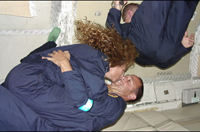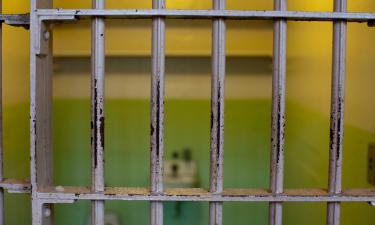Weddings and sex in space to become reality soon
Weddings in space could be right around the corner, and experts figure the inevitable cosmic consummation will be just around the next corner.

The Japanese firm First Advantage and the U.S.-based private spaceflight firm Rocketplane Global, Inc., announced last week they will host weddings in space for about $2.3 million apiece.
For all we know, sex in space has already taken place. But NASA officials aren't talking about that much.
Read also: Astronauts may conceive baby on board ISS someday
Beyond space tourism as a platform for steamy shenanigans, space missions are the perfect petri dishes for close encounters, and this year NASA certainly has a busy flight schedule, with five missions planned. And more countries than ever are now venturing into space, with Japanese astronaut Koichi Wakata slated to become Japan's first long-duration space flyer this year and China gearing up for its first spacewalk scheduled for October.
Things will get even more interesting with future long-duration missions envisioned for the moon, Mars and beyond.
"To say that astronauts are some superior beings who cannot have interests in any kind of sexual feelings for three years ... I just don't buy it," said Jason Kring of Embry-Riddle Aeronautical University in Florida. Kring also pointed out the possibly negative consequences of pregnancies in a microgravity environment.
"Are we going to sterilize our crew members before sending them to Mars?" said Kring, who studies the psychological effects of long-duration space missions.
Meanwhile, nobody claims to know whether "it" has happened already in space.
"We don't study sexuality in space, and we don't have any studies ongoing with that," said NASA spokesman Bill Jeffs of the Johnson Space Center in Houston. "If that's your specific topic, there's nothing to discuss," he added, referring to "sex in space."
Up until the 1980s, NASA crews were all male. In 1983, Sally Ride became the first American woman in space aboard the shuttle Challenger. Missions now routinely include one or two women.
"[For] a true long-duration mission if we go to Mars or back to the moon, politically, I don't think you're going to see an all male or all 'American' crew," Kring said.
Politics aside, "research would suggest that a mixed crew of men and women would probably be best," Kring said. "And this goes back to the Antarctic research where it used to be the expeditions were all men."
Nonetheless, co-ed crews, like the all-male ones, will have hefty workloads and little play time, Live Science reports.
"They're mission-oriented. They're very focused on the task at hand," said NASA spokesperson Nicole Cloutier-Lemasters of the Johnson Space Center.
Sexual frustration could ensue, however. "Human sexuality is a basic need and now you're trying to tell people, 'Hey for three years, you can't do that.' They're going to figure out a way to do it," Kring said.
If they do, they're on their own for now. Palinkas said there "is no official policy" at NASA regarding sex on space missions. "There really has been no research conducted on the area to know whether it [sex in space] would be a good thing or a bad thing," he said, "but it probably is inevitable."
Read also: Russian and U.S. astronauts have no sex in Earth’s orbit
As Pravda.Ru previously reported Russian scientists have resolutely reacted to the article published in The Guardian newspaper. The article said that Russian and American astronauts have sex on board the International Space Station. “Those are nothing but ‘sexual’ fantasies,” they claim.
NASA has always been trying to avoid the subject of sex in space. Russia’s discoveries supposedly done in this area sank into oblivion along with the Cold War period. But one publication in a specialized journal made U.S. space officials handle this sensitive issue.
Steven Johnson, Quest space journal editor, says that the publication touches upon the problem of easing sexual tension in the orbit.
“We do not know for sure whether astronauts masturbate during long flights or relieve the sexual tension in some other way, they do not do it on-camera,” says doctor Victor Shnaider, the head doctor of the NASA-Mir project.
Professor Johnson, who took part in space research works at University of North Dakota, assumes that scientists need to study this area further. The article under the title “Psychological and Social Effects of Isolation on Earth and in Space” which stirred up a controversy was written by scientist Peter Pesavento.
There is quite a list of undecided problems for both Russian and U.S. space medicine. They include depression caused by long space flights, complex crew relations and emotional and sexual consequences of protracted and coercive staying of male and female crewmembers on board, Pesavento believes.
Source: agencies
Subscribe to Pravda.Ru Telegram channel, Facebook, RSS!




